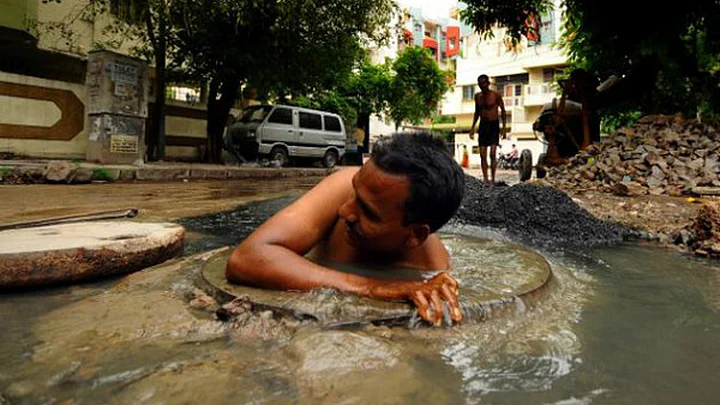Deaths of sanitation workers while cleaning sewers by hand – a practice banned 25 years ago – are nothing but “murders by the state”, according to activist Bezwada Wilson who has called a nationwide protest against manual scavenging.
The protests are underway in the national capital’s Jantar Mantar on Tuesday, 25 September.
Six people died while cleaning sewers in Delhi this month alone. Such workers, called manual scavengers, belong to oppressed castes that face extreme discrimination. United Nations found them among the poorest and the most disadvantaged sections in India. They cleaned dry toilets, which was banned in 1993. In 2013, the law was extended to include latrines, ditches and pits. Yet, the practice continues as implementation has been left to individual states.
“States lack the political will to address manual scavenging,” Wilson, who won the 2016 Ramon Magsaysay Award for his fight against the practice, told BloombergQuint in an interview. How can states allow this to continue, he asked.
Wilson, the national convenor of the Safai Karmachari Andolan, estimates that there are no less than 25 lakh such scavengers in India, of which almost 1.6 lakh are women.
The state must see that the law enforcing agencies are functioning. I must say that very clearly, these (deaths) are murders by the state.Bezwada Wilson, who won the 2016 Ramon Magsaysay Award for his fight against the practice.
National Shame
It’s a national shame that the government has not been able to provide adequate equipment like sucker machines to clean sewage lines and septic tanks even though the law terms scavenging a dehumanising practice, according to Wilson.
Despite repeated judgments by the Supreme Court to abolish the practice, he said there has been little change on the ground.
The Supreme Court said very clearly all state governments (should) find out all such people to enumerate after 2014. Four years have gone by. None of the governments have taken even a single word of enumerating that (sic).Bezwada Wilson
Rehabilitation
The National Commission for Safai Karamcharis was created in 1993 to monitor the effective implementation of the law. It was expected to submit a report every five years, according to Wilson.
After the first five years, its statutory status was taken away and can’t prosecute anyone, Wilson said, adding that budgetary allocations for the commission are also meager.
Scanty Provisions
There’s also a provision for rehabilitation of manual scavengers in both the 1993 and 2013 laws. There’s also a special employment scheme but over the last four years, Wilson said the budget allocation has gone down from Rs 570 crore to 5 crore.
The activist hopes a public campaign could help bring a change. “We as a country, the citizens together, we have to come and say openly that I cannot accept my fellow human being to enter the sewer and septic tank.”
(This article was originally published in BloombergQuint)
